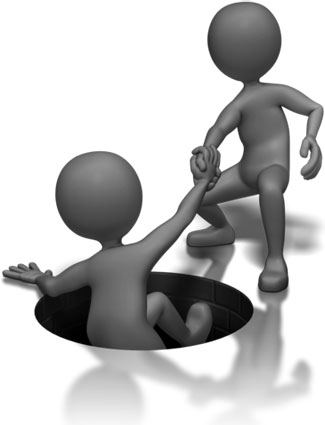 This post is inspired by recent conversations with some of my former clients who have changed vocations after their time spent in coaching and have gone on to work professionally, or in a volunteer capacity, with people who suffer with chronic pain. Three separate former clients have taken up this path, following in my own footsteps, working as a counselor, a doctor and a volunteer for a chronic pain support group, respectively.
This post is inspired by recent conversations with some of my former clients who have changed vocations after their time spent in coaching and have gone on to work professionally, or in a volunteer capacity, with people who suffer with chronic pain. Three separate former clients have taken up this path, following in my own footsteps, working as a counselor, a doctor and a volunteer for a chronic pain support group, respectively.
I have discussed the challenges of surrounding oneself with pain on each occasion, as concerns were brought to light by each former client. All this reflection has reminded me of the challenges I too have faced working with people who suffer from very similar conditions to my own tormentors. Therefore, I wanted to share my thoughts on working in the pain sector on a personal level. However, my main desire in this article is to provide comfort and support for the many of you who find yourselves in similarly uncomfortable positions. You want to help others, but being encompassed by pain tends to draw you back into your own suffering to one degree or another. I hope this discussion helps to put things in perspective for you.
I was very young when I realized that I felt a strong desire to help people who are suffering. I had terrible bouts of back pain as a young man, starting at the age of 16. I was also affected by chronic wrist pain and stomach problems from an even earlier age. By the time I was in my early twenties, I was already actively involved in patient advocacy work in the medical sector and was busy propagating my thoughts on why the treatment of chronic pain seemed to be completely illogical and misguided. More importantly, I had actively begun cultivating strong relationships that helped my research efforts as to why chronic pain affected lives in the tyrannical manner in which it does.
Initially, I was driven towards this path in order to help myself and ensure that my future would be better. However, it did not take long for me to develop the empathy to place other people’s suffering at an equal position to my own, pushing me harder to help myself and others to live better, despite our impediments. Over the course of the next 2 decades, I continued to suffer from back pain and other issues, but I immersed myself in the pain treatment sector despite the fact that I realized being embalmed by suffering can be very counterproductive to one’s own recovery. It is because of this realization that I now have instituted steps into my own literary offerings and coaching work to help care workers to overcome the considerable obstacle of feeling better, despite being possible surrounded by others who feel worse.
It is always difficult to see anyone in pain and miserable in their life situation. However, for people who are also residing in these dark places of pain, or have been affected by pain in their past, it is far worse. These people, such as myself, often tend to project the possibility of similar suffering into their own lives. When they witness a person with a similar pain issue, they tend to consciously or subconsciously fear being affected again, anew or in worse ways by their own agonizing pain or illness.
Escapism can be a great thing for sick and pained people. Learning to put the pain in a place of less importance allows life the chance to fill the primary slots with wonderful experiences and memories. A full and productive life literally demotes pain to a less important place in one’s world. I can tell you that in the best of times, my pain might have been objectively just as bad physically, but its effects were far less damaging or even noticeable because there were simply too many positive balancing factors in life to allow the symptoms to gain any real foothold on me. However, when reintroduced into an environment of pain, it is easy for the mental, physical and emotional consequences of pain to gain firm foundation in one’s life.
In my own case, there is never a single day that I am not working to help others in some capacity. In fact, most of my days are very long and completely filled from waking time to bedtime with the pain that seems to be consuming the entire population of our modern world. Between writing, reading, researching, interviewing, advocating, coaching, mentoring and distributing knowledge to the pained and ill population, I rarely have more than a few minutes when pain is not the very focus of my world. It is easy to become dominated by all this pain. I know what my former clients are going through when they call me to discuss how working with other suffering people seems to pull them backwards into their own suffering once again. This is my reality, as well.
In order to change the tone of this post from one of sad martyrdom to one that actually helps people to move forward, I must tell that over time, I have learned to not only manage the darkness that re-invites pain, but also to actually use the negativity to further increase my recovery efforts, as well as improve the work I do to help others. I find these tactics to be necessary for anyone who is working in the recovery industry, pain coaching, certain medical fields and in mental health disciplines, if the professional in question was, or is, affected by the same conditions they help others to resolve.
It is vital to overcome the fear that you will slip back into bad habits and misery, just because you might be surrounded by these negative influences daily. Instead, it is always necessary to remind yourself that you need to stay healthy and strong in order to do the work you were meant to do; i.e. helping others. You must adhere to the practices that have worked for you and use these techniques to transcend the suffering which might affect those you work with, but does not have to permeate your own world. Most of all, you must continually find ways of using your own bitter experience to provide empathy and sympathy for those who have not yet reached an acceptable level of self-managed pain control and illness reduction.
I am happy to advise healthcare workers, mental health professionals and anyone who uses their knowledge and courage to help people who are chronically sick or in pain. I have seen many of these fine professionals return to suffering themselves and this is no coincidence when one considers the work that they do. If you are a care worker with a history of pain or illness and need guidance on this vital topic, please feel free to reach out to me anytime. I will be more than happy to help you to continue helping others with your dedication and selflessness, despite the burdens you may fear or actually endure.



